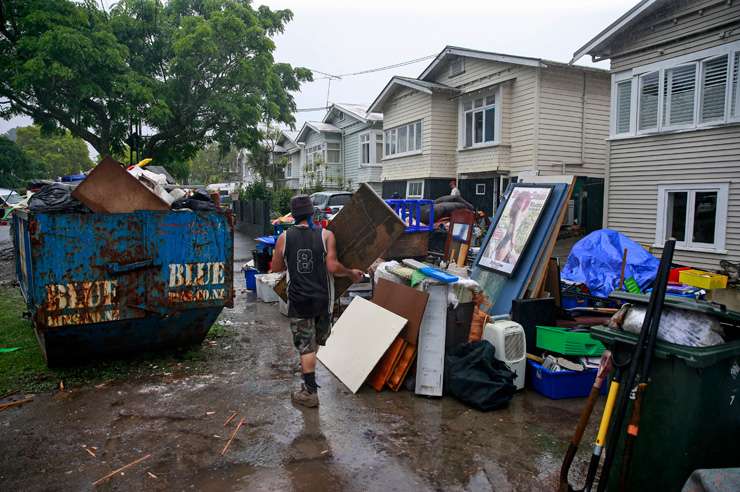A week, or even a day of record-beating rain, can make a big difference to homeowner fortunes. Peak flood in Auckland is putting pressure on inflation, and peak inflation equals peak interest rates, says Kiwibank chief economist Jarrod Kerr.
Last week, Kerr argued that the Reserve Bank of New Zealand was unlikely to push the Official Cash Rate up to a high of 5.5% and that a peak of 5% was looking much more likely.
“The world war on inflation is being won. Inflation rates, globally, are improving. Our imported inflation is likely to ease over the year ahead,” he wrote in his economic update.
“Locally, inflation is running at 7.2%, slightly above our forecast of 7.1%, but below the RBNZ's 7.5% forecast. Inflation is likely to have peaked, however, with a downtrend in the data forming.”
Start your property search
Kerr expects that the RBNZ will push the cash rate up just 50 basis points on February 22, “a step back from the outsized 75 basis points signalled”.
“We have seen more than enough to justify a reduction in the pace and extent of future rate rises. A move to 5.5%, as signalled by the RBNZ, is likely to be a step too far. We expect a move to 5%. Rates markets should react. Kiwi wholesale interest rates may have peaked,” he wrote.
Read more:
- Tony Alexander: Signs that the housing market is pulling back from the edge
- Interactive: Find out house values in your suburb
- House price plunge may not make property more affordable, say experts
He could be right. This week the New Zealand Herald reported that two of the major banks, ANZ and BNZ, had made cuts to their longer term home loan rates.
BNZ economist Doug Steel agrees with Kerr that the RBNZ doesn’t need to push rates up 75 basis points this month. “That said, the RBNZ has seemed to be putting more weight on current conditions than forward-looking indicators,” he wrote in his update.
In light of the uptick in the unemployment rate, from 3.3% in the third quarter of 2022 to 3.4% in the last quarter, BNZ predicts a rise 50 basis points in the cash rate, taking it to 4.75%.
Steel said that economy watchers needed to remember that a tight labour market could prove a problem and feed through into the inflation numbers that the RBNZ eyes when making its decision.
Impact of Auckland’s floods
The ASB, ANZ and Westpac banks released their preliminary post-flood predictions for the economy on Tuesday. It’s going to take time to come to grips with the damage in New Zealand’s biggest city, ASB chief economist Nick Tuffley said in his weekly economic wrap. The clean-up will divert scarce construction resources away from important projects set to deliver longer-term value, such as new infrastructure.

The clean-up cost of the severe flooding that affected Auckland this week is expected to be high. Analysts believe the floods will put upwards pressure on inflation. Photo / Alex Burton
Rebuilding was inflationary, said Tuffley, with building and material costs likely to rise. Insurance costs could also rise, as they did after the Canterbury earthquakes, and there is the potential that scarcities in fresh produce will boost food prices, although the impact will be only felt in the short to medium term.
“What has happened is likely to only make a difference to RBNZ decision-making at the margin,” Tuffley said. “It is the medium-term inflation and employment drivers that remain the prime determinants of the inflation outlook and the RBNZ’s response.”
Onions and inflation
ANZ’s chief economist Sharon Zollner doesn’t think the floods will fundamentally change the broader economic outlook, but she does believe, like Tuffley, that they will up the cost of fruit and vegetables, rents and transport. She does warn that rises in inflation can result in rises in interest rates.
“This weather event is primarily a supply shock for the economy,” Zollner wrote in her weekly report. “Significant disruption is occurring to transport, with roads closed or damaged, supply chains more generally, including via lost inventory, and – yet again – fruit and vegetable supplies, at a time when food price inflation is already running at 11% year on year.
“The floods have significantly impacted vegetable production, particularly in the Pukekohe region. This will mainly impact domestic supplies, and therefore the price of green vegetables and some root vegetables. There will also be a lot fewer onions available for export as many onions currently drying in paddocks have been washed away, and fewer onions that are harvested are expected to make export grade.”

ANZ chief economist Sharon Zollner: “This weather event is primarily a supply shock for the economy.” Photo / Dean Purcell
She also predicts that construction costs could increase. The rebuild isn’t on the scale of post-quake Christchurch. “But further pressure on an already stretched local construction industry will likely be inflationary.” The increased building activity might boost GDP. “But it’s not a path to well-being - just ask Christchurch.”
Goodbye wealth
Thanks to under-insurance, the floods could also have an impact on wealth. “There’s long been concern that the shift in the house insurance market towards fixed sum-insured could result in an increasing degree of under-insurance over time,” Zollner wrote. “Though this is only likely to kick in with something close to a total rebuild rather than minor repairs. Another factor is that many households could have reduced or stopped their contents and car insurance as they have attempted to cut living costs.”
She added that the floods would also put some short-term pressure on housing supply and rents due to displaced people and lost housing. “Brave long-term decisions will need to be made about housing.”
Biggest climate-related insurance event
Westpac’s economists kicked off their post flood update with estimates for insurance claims. “At this stage, the cost of the rains is expected to be New Zealand’s largest climate-related insurance event. More than 6000 claims had already been lodged with insurers by Sunday morning,” said senior economist Satish Ranchhod.
“Although a large share of those costs will be borne by insurers, many households will be left with large bills. There will also be a large amount of damage that is uninsured.”



















































































